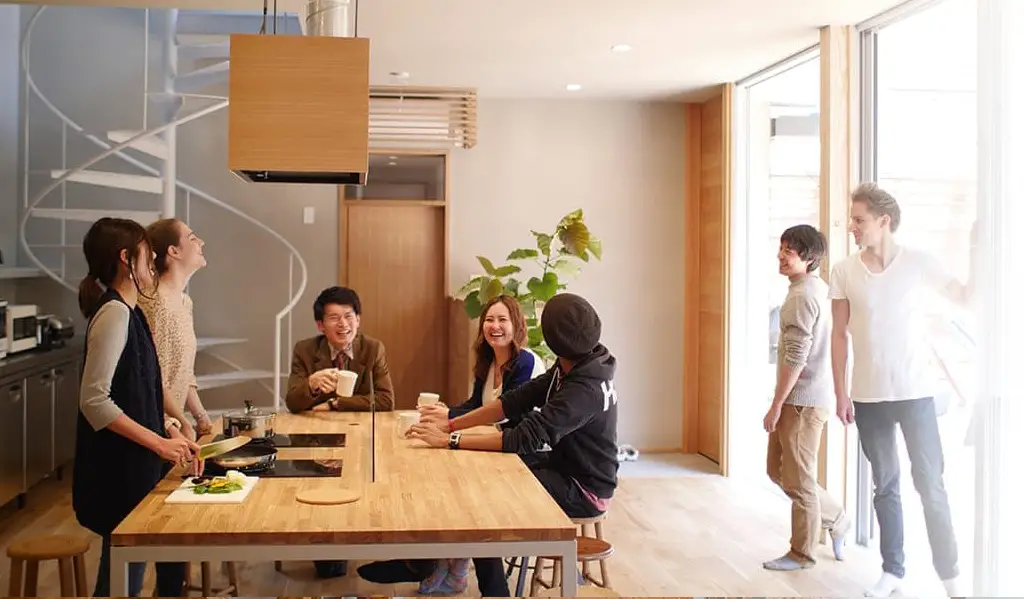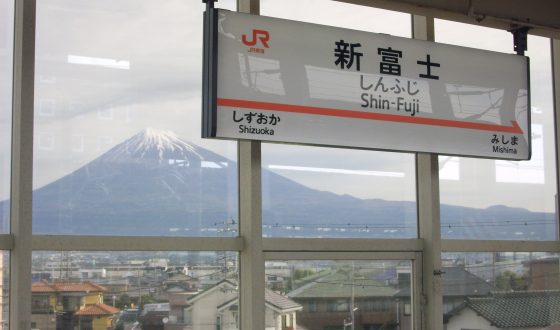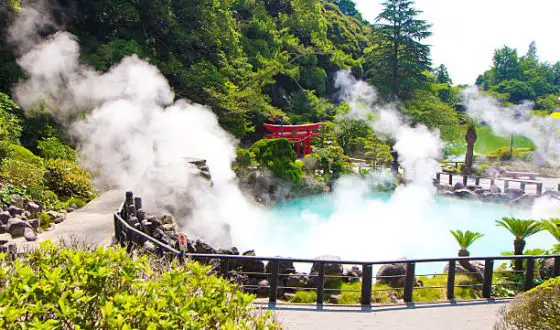2020 Guide To Share House In Japan
The housing expenses have always been burdensome for most foreigners living in the Land of the Rising Sun. Although sometimes they have to pay an enormous amount, their benefits are limited. Therefore, with an aim to solve these problems, a new concept of share house in Japan is introduced.
This type of living arrangement has also emerged as a popular alternative choice for young native singletons residing in Japan, particularly because tenants have a decent place to sleep as well as an outlet to relieve their loneliness and socialize.
This location guide will show exactly what a Japanese share house is like and whether or not it is a good fit for you? Stay tuned till the last, when we reveal how you can find a good share house for your own.
What is a “Share House”?
Share House is a form of accommodation in which three to 10 people rent a house together. Usually, you will get either a private or semi-private room and the rest of the house will be communal. The community spaces are such as the kitchen, bathroom, living room along with their facilities. This can be great if you have just come to Japan and are feeling homesick or lonely. There will always be people around you can talk to you. Share House residents can interact and communicate with one another by sharing the community space which cannot be achieved in one-room apartments or goshiwon (single rooms around 5 square meters where students preparing for national exams often live).
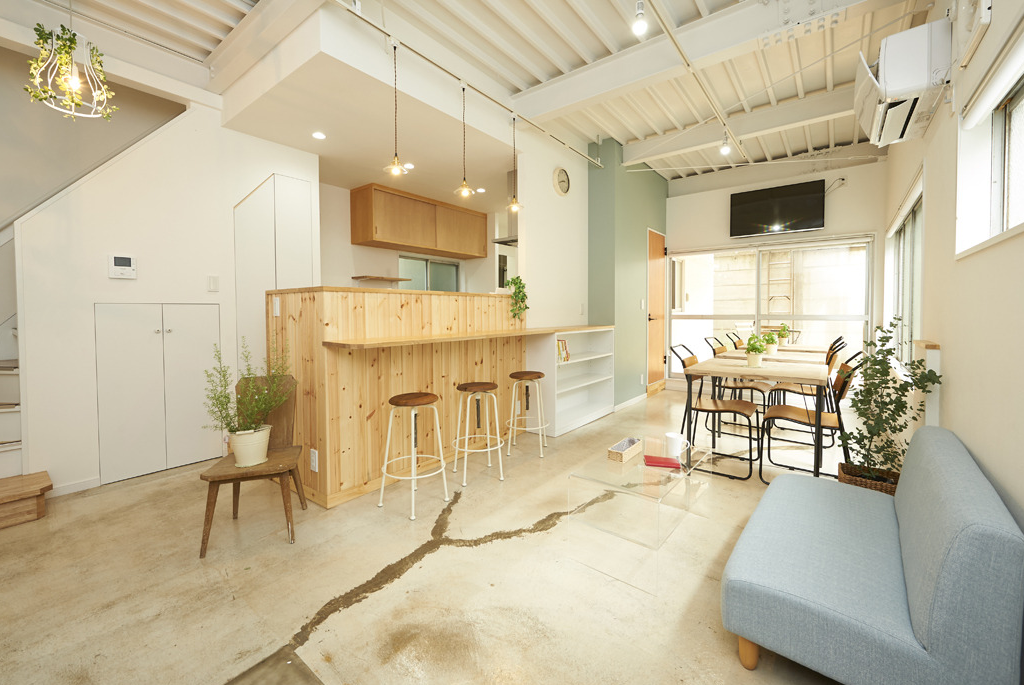
Community spaces are places such as the kitchen, shower room, washroom, or lounge where residents can come together to share or exchange.
SEE MORE:
Thus, people residing in the share houses can save their housing expenses. These are often cheaper than apartments but also come with the upsides and downsides of living with others. How you will enjoy the housing is unfortunately highly dependent on whom you live with.
If you are considering living in a share house in Japan, we recommend you take a closer look at its pros and cons.
Pros
You can move in with the lowest possible cost.
If you are interested in Japan, you will be surprised to find it difficult to rent a room.
Among them, it is the unignorable problem to pay a lot of costs to rent a room. Why? Well, in Japan you have to pay huge initial fees (3 to 4 months’ worth of rent), at a regular rental apartment BEFORE you even move in, including:
Rent + Key Money + Agency Fee + Guarantor Fee
- Key money (Reikin) or gift money is a non-refundable gratuity you pay to the landlord. This is a custom peculiar to Japan.
- Agency Fee (Chūkai tesūryō) Your agency will also charge you as commission for helping you find and apply for the apartment.
- Guarantor Fee (Hoshōgaisha riyō-ryō) You will also be required to have a guarantor to rent an apartment. A guarantor is a person or company in Japan who will vouch for you as a tenant. If you fail to pay your rent, your landlord will go to your guarantor to collect.
Furthermore, consider the monthly cost, outside of rent:
Electricity + Water + Gas + Internet + Maintenance Fee
These fees would also be necessary. Plus, if you were to buy new furniture and appliances, that could easily cost at least 100,000 yen or more. The reality is that renting a regular rental property takes a lot of money.
For most share houses, there are:
- No key money, agency fees
- One-time-only Contract fee
- No guarantor necessary
- Utilities, bills, and wifi often included with the rent
Basically, just rent + small maintenance fee. That’s it!
An average share house in Japan rent will be around 50,000-90,000 yen a month including bills. The range is relatively large as it can depend on location (both city and ward), size of room and range of facilities. The deposit will normally be a month’s rent or slightly more and the management fee can vary from company to company. Overall, it is much more reasonable compared to at a monthly average rent of US$1,200 – that’s around ¥130,000 – for a “typical” one-bedroom apartment in Tokyo.
With a reasonable price, you may be provided with a living condition like this:
You still have your privacy
With a dormitory, all your space is shared and privacy is fleeting if not non-existent. With a Japanese share house, things are a lot simpler. They’re cheaper than an apartment and you get your own space to relax.
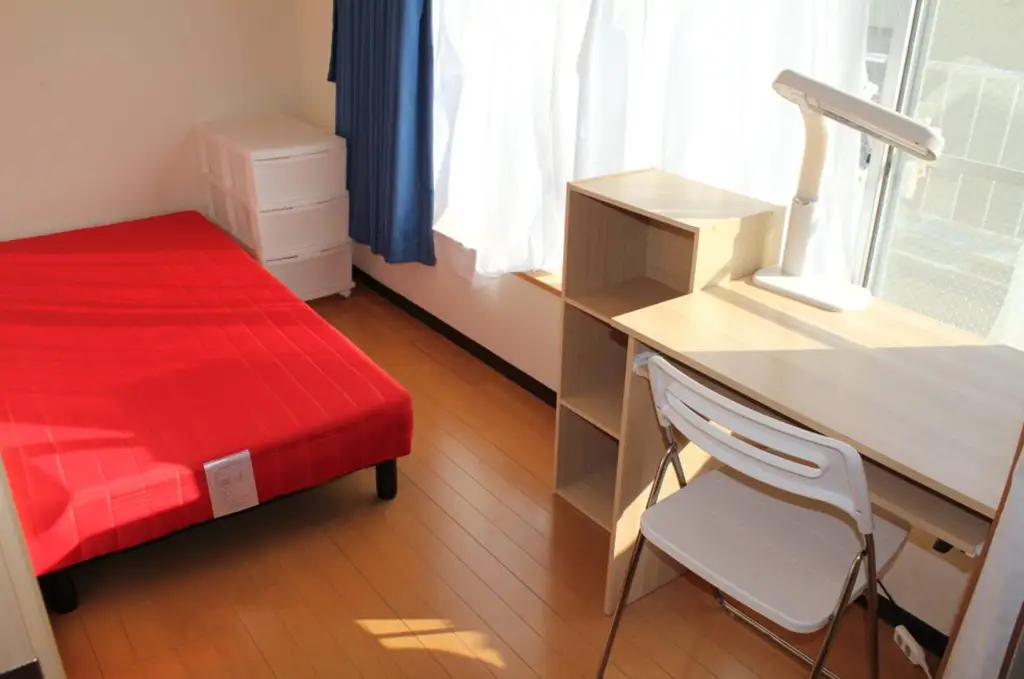
Inside a private room in the share house
Of course, there are different types of rooms available for different needs at a share house.
Whether you want to stay with your friend as two people in a shared room, or whether you just need a base camp to sleep in at night and choose a dormitory room, the reasons are innumerable.
You don’ t have to think about appliances
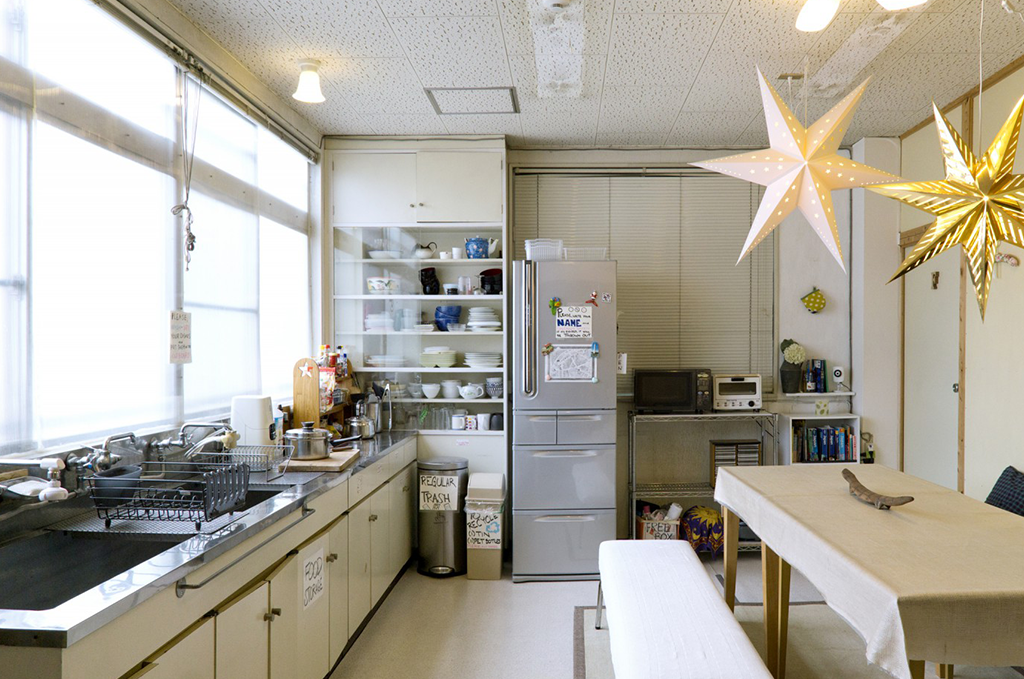
You won’t have to scramble to pick up appliances and cutlery, you’ll be ready from day one.
Most private rooms in share houses are fully furnished with a bed, desk, a closet or drawer for clothing, and most importantly, an air conditioning unit. If you want something a little fancier, there may be a chance to have your own fridge in your room and even a balcony. The kitchen, showers, and living area are usually shared. With all of these things readily available, moving in is as simple as opening the door to your room.
You can practice your Japanese for free
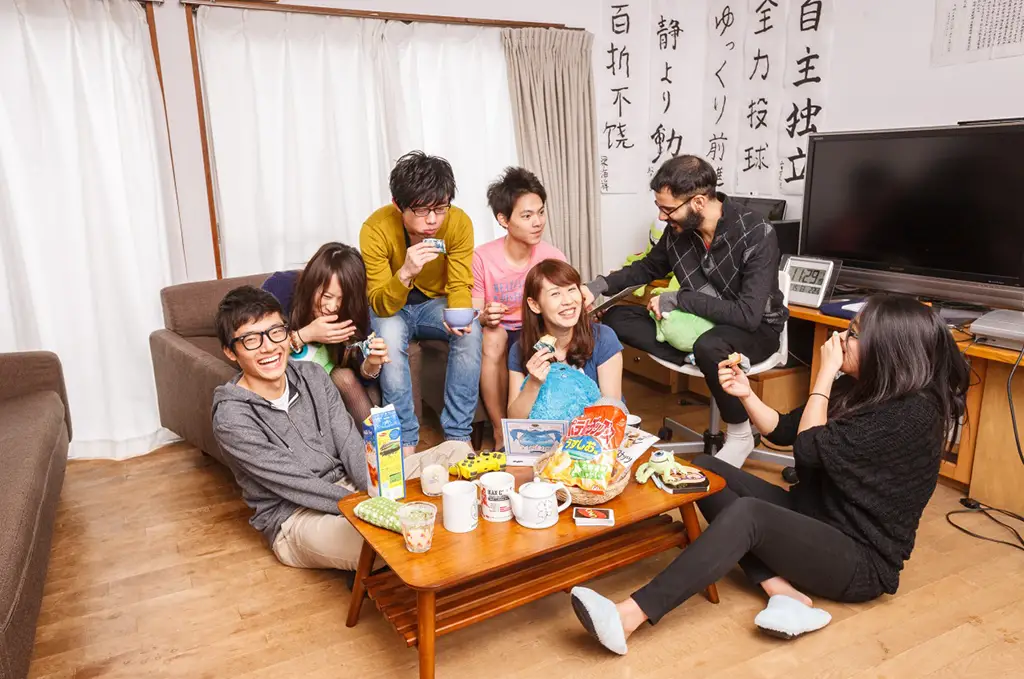
You can make Japanese friends in a highly social atmosphere
On average a Japanese share house is populated by around 50% Japanese people. This gives you the perfect chance to practice your new language skills in a more relaxed environment with native speakers and language exchange is a good way to make new friends. If you’re really lucky and you become good friends with your Japanese housemates, they might teach you how to make some amazing proper Japanese food.
Change your mind, just move out tomorrow!
The rental period is much more flexible when it comes to share houses. Again, it depends on the company you are renting from but you will often have the choice of how long you stay for. This is perfect if you are looking to stay for the short-term or long-term. Notice periods are also often only a month so you’re not stuck in your circumstance change while you’re out in Japan.
Some companies even allow you to transfer between share houses. It means if you think that you might want to live in a different area, there are other houses you can transfer to as well!
Cons
You can’t expect ultimate privacy
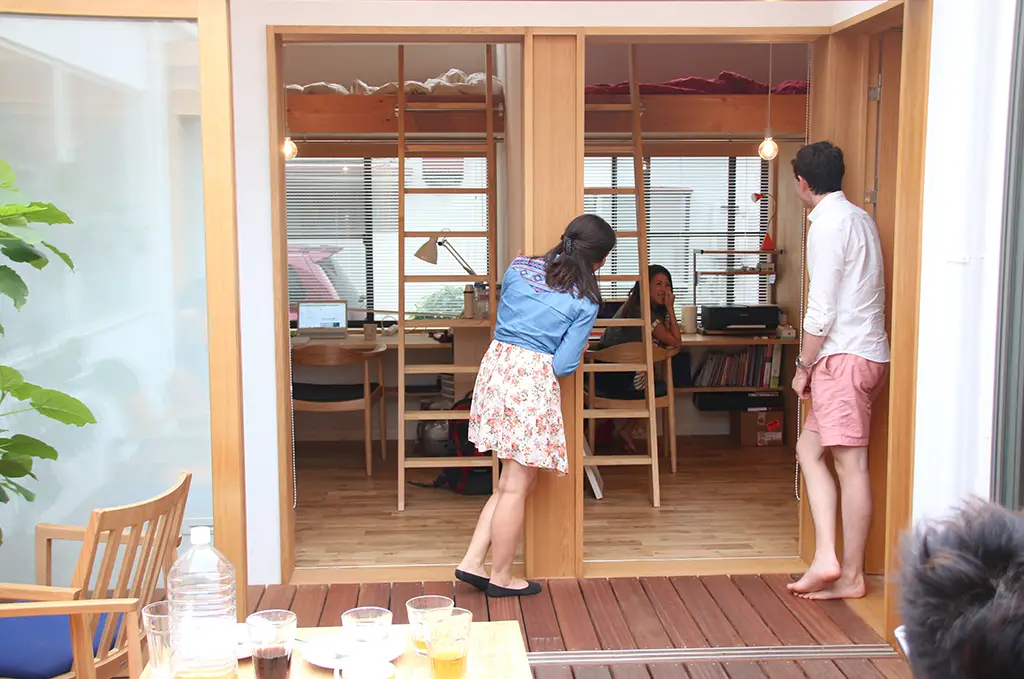
In general, you will have less privacy in a share house compared to even a studio apartment.
Although you do have your own room with a lock and key, you have to let staff members know if someone stays for longer than one evening. The staff will then inform the other sharehouse mates. In addition, it is also likely to hear through the walls. If people were talking on the phone, laughing in the living room downstairs, or even arguing, you can hear it.
You have to learn to adapt your habits (Don’t be a messy roommate)
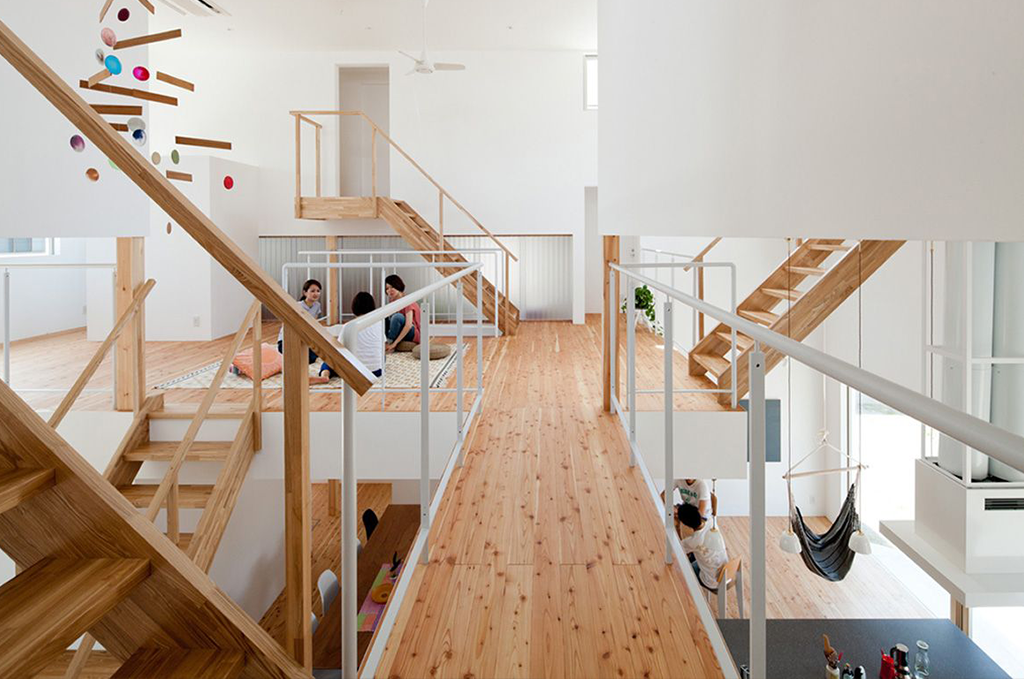
Remember that you’re sharing space with others so it’s important to keep things tidy.
You have to bear some undesired habits from other people
Likewise, you can’t choose your housemates. Everyone has their own lifestyles; everyone is on different schedules. Clashing is possible. It can be magnified somewhat by the difference in cultures and it’s something to be aware of when you move in.
Finding your share house in Japan
What Sharehouse Characteristics do you want

Location: the main question to ask is if you want to be in the city center or if you’ll be ok a little further out from the action
Check these Tokyo sharehouse characteristics before selecting your new home:
- Neighborhood & Amenities – Check if the location is walking distance to a train station, and if there are convenience stores nearby. If it’s located on a busy street or near train tracks, you may have concerns about noise.
- A number of tenants in the sharehouse – This can range from 3 people in a shared apartment, up to 50+ people in a large building. Expect 50% of the tenants in your sharehouse to be actively social, and expect the other half to be work-eat-sleep oriented.
- Kitchen Size – If you love cooking, or plan to make meals at home, it’s important to have a large and functional kitchen. In old Japanese buildings, kitchens are often tiny. More modern sharehouses will have big kitchens with plenty of cooking spaces and large fridges.
- Living Room/Common Area Size – If you want to have a social time in your sharehouse, it’s important to have a functional living area where people can gather in the evenings or on the weekends.
- Neighborhood & Amenities – Check if the location is walking distance to a train station, and if there are convenience stores nearby. If it’s located on a busy street or near train tracks, you may have concerns about noise.
- On-Site Laundry Availability
Tokyo Sharehouse Contract Obligations to Check For
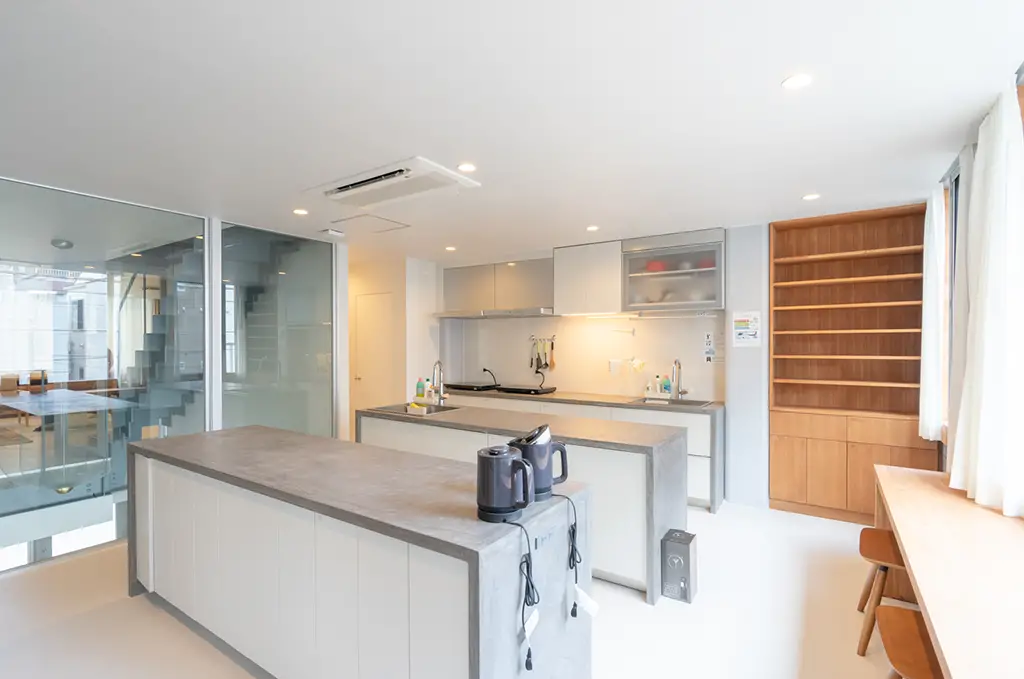
There’s a wide variety of share houses that you can find in Japan.
Different Tokyo sharehouse companies have different rules for their tenants in their properties. These are important to keep in mind before signing your contract because it can restrict your flexibility while living in Japan.
- Minimum Contract Length – Can be 1 month to 6 months minimum. Keep in mind how long you want to stay, and what you have to pay if you end up leaving sooner than the contract expiration date.
- Male-only or female-only sharehouses – These types of sharehouses are not uncommon, and may even have rules stating visitors of the opposite sex cannot enter the home
- Guests staying the night – Some sharehouses do not allow guests to stay over, period. Some may charge 1000-1500 yen ($9-$13 USD) per night that you have a guest stay over, while some sharehouses let guests stay for free as long as it is under a certain number of nights per month.
- Lockout rules, curfews
Websites to help you find a Sharehouse in Japan!
Luckily, share houses have a strong online presence. As such, there are a few great services out there for finding a share house in Japan.
- Sharestyle– focus on language exchange, foreigners and Japanese living together
- Borderless Sharehouse– dorm room options with 50-50 foreigners and locals
- Sakura House– locations in Tokyo and Kyoto
- Tokyo Sharehouse– I used this site the most, which has many filter options
- House– lists locations around Tokyo and Japan, some very cheap
- Sharehouse Bank– lists locations in Tokyo and the greater Tokyo region
Check these websites to find a sharehouse in Japan for you. Get in contact with the companies (everyone will be able to write back in English) to get the ball rolling on your new life in Japan!
Once you’ve moved in there’ll be a chance to relax and settle in but don’t forget to register your address at the local ward office within the first two weeks. You may need to buy a few essentials too such as bedding and your own bowls and plates. A trip to the hundred yen store is a must!
CONCLUSION
During the past five years in Japan, the popularity of Share House has been skyrocketing in the sense that it enriches the living quality of single households through intercommunication with other people. If you wanted cheaper living, more enjoyable living, and a place where people can gather together, share house is a place for you.
Happy Hunting!

